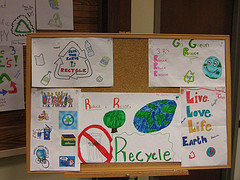Green Awareness Activities for Toddlers to Teens
 Environmental protection is an issue that affects our children deeply. The condition of the world when they grow up will shape their health and their lives. Even very young toddlers can be introduced to the idea of living green as they help parents or other caregivers toss paper and plastic into recycling bins or turn off lights when leaving a room. Just keep your instruction about environmental topics upbeat and suitable for your child’s developmental stage. Then reinforce these ideas with fun green activities based on what kids naturally enjoy doing.
Environmental protection is an issue that affects our children deeply. The condition of the world when they grow up will shape their health and their lives. Even very young toddlers can be introduced to the idea of living green as they help parents or other caregivers toss paper and plastic into recycling bins or turn off lights when leaving a room. Just keep your instruction about environmental topics upbeat and suitable for your child’s developmental stage. Then reinforce these ideas with fun green activities based on what kids naturally enjoy doing.
FOR VERY YOUNG CHILDREN
Singing. Most children love to raise their voices … in song or otherwise. Belting out simple, repetitive lyrics is a great way for kids to learn “Reuse, Repurpose, Recycle,” the basic 3 R’s of going green.
Making Noise. Accompany the singing with the sweet sound of banging. Have youngsters tap out a rhythm on old metal or plastic containers and other objects (unbreakable, please!) before placing them in the appropriate recycling bin.
Counting. Ask your children to count items to be recycled as they go into the bin. Tots who are not yet familiar with numbers can describe their colors instead.
Sorting *and* Bossing Mom and Dad. This is great for under fives. Make some obvious mismatches, along the lines of: “Let’s see, this old glass pickle jar belongs in the paper recycling, right?” Dollars to donuts your little ones will have a great time correcting your mistakes.
Making a Mess. Throw a hands-on DIY natural cleaning product making session, the gunkier the better. Dress code: super casual; old clothes recommended. On a very warm Virginia day, have youngster wear bathing suits and work on your patio. When you’re done, hose down the children together with your Virginia Beach tile flooring.
GRADE SCHOOLERS
Playing. Introduce kids to online and board games that promote ecological awareness, such as these offerings from NASA and PBS.
Earning. Hand out stickers that will eventually earn a prize to reward youthful efforts in a specific green area. Alternatively, help organize a deposit container collection, with proceeds going to the children.
Creativity. Collect a selection of repurposable materials such as used gift wrap and odd buttons. When a rainy Sunday or school holiday comes along, pull out the items as the basis for upcycling projects. You might want to go with a theme like wall art or homemade Christmas presents.
Thirst for Novelty. Coordinate a “free marketplace” where kids can swap no-longer-wanted items such as used toys, books and/or clothing -- with permission from their parents or guardians, of course.
TWEENS TO TEENS
Competition. Ask each child – or team of kids – in a family, school group or club to come up with a recommendation for their group to function in a more eco-friendly way. Then vote on the best suggestion. Whoever wins gets an hour of “slave service” from the others.
Observation. Encourage 11 pluses to keep a green journal, recording one new example of environmental protection (or its opposite) every day for a specific period of time. The results could be turned into an article for a student newspaper or online teen forum. Or suggest a multi-media approach which combines writing, photos, video and whatever else the author chooses.
Decision making. Allow older children to have a voice in summer vacation and other leisure plans based on environmental impact. This will work best if you present a limited number of option to be decided upon, rather than leaving the field wide open, and are truly prepared to accept the results of a group decision.
Laura Firszt writes for networx.com.
Looking for a Pro? Call us (866) 441-6648

Average Costs
Related Experiences

Yard Clean Up Left Our Lawn Looking Fantastic

Yard Cleanup And Lawn Care Service With A Great Work Ethic



